美国副总统乔拜登英文介绍
美国副总统拜登5月5日在美中商会早餐会英语演讲稿
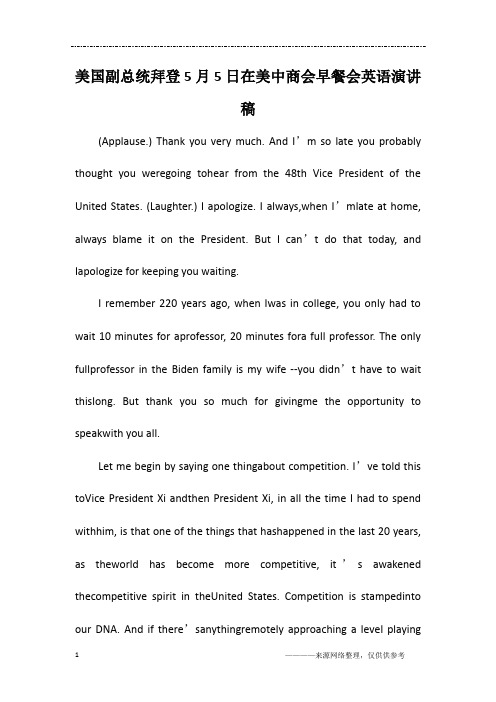
美国副总统拜登5月5日在美中商会早餐会英语演讲稿(Applause.) Thank you very much. And I’m so late you probably thought you weregoing tohear from the 48th Vice President of the United States. (Laughter.) I apologize. I always,when I’mlate at home, always blame it on the President. But I can’t do that today, and Iapologize for keeping you waiting.I remember 220 years ago, when Iwas in college, you only had to wait 10 minutes for aprofessor, 20 minutes fora full professor. The only fullprofessor in the Biden family is my wife --you didn’t have to wait thislong. But thank you so much for givingme the opportunity to speakwith you all.Let me begin by saying one thingabout competition. I’ve told this toVice President Xi andthen President Xi, in all the time I had to spend withhim, is that one of the things that hashappened in the last 20 years, as theworld has become more competitive, it’s awakened thecompetitive spirit in theUnited States. Competition is stampedinto our DNA. And if there’sanythingremotely approaching a level playingfield, we’ll do just fine -- just fine.And so I want to thank theAmerican Chamber of Commerce and the U.S. Business Councilfor inviting me heretoday. You are living the U.S.-Chinarelationship every single day, and youknow the opportunities, but you alsoknow the obstacles. And it’s great to beback together onelast time here in Beijing with our Ambassador, GaryLocke. I say one last time because heisgoing to be heading back to his home state of Washington after a verydistinguished career,which I don’t think is anywhere near ended, as bothgovernor, member of the Cabinet, as well asthe Ambassador.And Gary and I were speaking thismorning as I was -- there was a telephone call, they saidI’m requiredupstairs. And one of the things I likeabout Gary -- there’s no member of -- nogovernor or member of Cabinet that Ihave enjoyed working with more, because Gary speaksEnglish. By that, I mean not English versus Chinese; Imean plain versus complicated. (Laughter.) And so when Gary speaks, everyone understandsexactly what he means.And as you know better than I,communication is the currency, andparticularly thecurrency that is neededmost here in China. He’s been anAmbassador to the Chinesegovernment, but also to the Chinese people, and hewill be missed. I remember, I washereshortly after Gary arrived and every newspaper you’d pick, even though I don’treadChinese, I’d see Gary’s picture -- because he connected. He connected immediately with theChinesepeople as a representative of our country and knowing -- the Chinese peopleknowinghe was reaching out not just to the government, but to them.I had a chance since I’ve beenhere -- it’s been a very rapid visit, and it’s been 14-hour days,but veryuseful -- I had a chance to talk with Vice President Li, and I will spendseveral hours --and I spent I guess almost four and a half hours withPresident Xi. And I’m honored thathewould give me the time to go into such detail, both in a private bilat with himas well as anexpanded, as well as a lovely dinner he hosted for me and a fewof my colleagues. Later, I’ll bemeetingwith Premier Li.And I want to talk to you aboutmuch of what -- some of what I’ve talked to all of themabout and what Ibelieve to be are next steps in the U.S.-China relationship.We’re trying to build a new kindof relationship between major powers, one that’s different,one that is definedby constructive cooperation, healthy competition, and a shared respectfor anagreed upon new set of rules of the road and international norms for the 21stcentury.After World II, our grandfathersand fathers and mothers put in place a structure thataccommodated the economicchange that took place in the world and set up a new set of rules ofthe roadfor the remainder of the 20th century. We’re in a different place now. You all know itbetter than I do. We use the phrase in colloquial conversation in all our countries thatit’s a“global economy.”But it’s trulya global economy -- a global economy.My colleagues always kid me aboutquoting Irish poets all the time. Theythink I do itbecause I’m Irish. I do itbecause they’re the best poets. (Laughter.) And William ButlerYeatswrote a poem called Easter Sunday 1916, about the first rising in Irelandin the 20th century.And he had a linein it that better describes, I would argue, the Pacific Basin in the year2019than it did in his Ireland in 1916. Hesaid, “All is changed,changed utterly, a terriblebeauty has been born.”We’re at a moment, a window, asthey say, of opportunity. How long itwill remain openremains to be seen -- where we can potentially establish a setof rules of the road that providefor mutual benefit and growth of both ourcountries and the region, that set down sort of thetracks for progress in the21st century. I think it is thatprofound. I think that’s the place,that’sthe inflection point we are at in our relationship now -- not only with Chinabut the entireregion.And so the only path to realizingthis vision for the future is through tangible, practicalcooperation andmanaging our differences effectively. We’venot tried this before. We’ve nottriedthis before. This is going to bedifficult. But if we get it right, theoutcome for our childrenand grandchildren can be profound -- profoundlypositive.But to move this relationshipforward, there is no substitute for direct and personalengagement betweenleaders. President Xi pointed out to me,because I had an opportunitywhen he was vice president to spend someconsiderable time with him at the request ofPresident Hu and then -- andPresident Obama. He made indirectreference to -- therewas afamous American politician named Tip O’Neill, who Iadmired a great deal and was sort of amentor when I was a young 29-year-oldsenator coming into Congress. And he’sfamous forhaving said all politics is local. Well, I believe all politics is personal, includinginternationalpolitics.Personal relationships are theonly vehicle by which you build trust. It doesn’t mean youagree, but trust to know that the man or woman onthe other side of the table is telling youprecisely what they mean, even ifyou don’t want to hear it. That’s whyPresident Obama askedme to make this visit, and that’s why President Xi and Ispent so much time together yesterdaydiscussing in great detail a whole rangeof issues we face together that are difficult for both of usto navigate in ourown political system.These were very candidconversations. I know it shocks you tothink I would be candid. Iknow that’s ashocking assertion. No one has doubted that I mean exactly what I say. Theproblem is I sometimes tend to say allthat I mean. (Laughter.) But because our relationship isso complex,getting it right isn’t going to be easy, and it’s going to requiredirectstraightforwardnesswith one another about our interests, our concerns and, quite frankly,ourexpectations. And that was the nature ofthe discussion yesterday.Let me start with economics, notbecause this is a business audience, but becauseultimately what matters moston both sides is our ability to deliver better for our peoplewithout it beingviewed as a zero-sum game.I have saidsince I met with Deng Xiaoping as ayoung senator, with very senior senators, thatChina’s economic growth is very much in theinterest of the United States ofAmerica -- very much in our interest. Inmy meetings withPresident Xi, he and I spent a good deal of our timediscussing the outcomes of China’s thirdplenum. China’s leaders have stated their ambition tomove China toward a system where themarket plays a “decisive role.”That is a very, very big order that willrequire on the part of --and I’m confident he possesses it -- the leadershipof this country and the President.But, in fact, many of the reformsChina’s leaders are proposing actually match the prioritieswe have raised withChina over the years. Leveling theplaying field for private and foreign-ownedcompanies -- it’sgoing to be adifficult, difficult transition. Protecting intellectual propertyand trade secrets, which isessential. It’s not a surprise that anumber of American companies arecoming home in their manufacturing. Why? Well, we have very productive workers, but alsowe have court systemsthat are totally transparent. Intellectual property is protected. Itmatters. And I think it’sbecoming apparent to our competitors around the world that itmatters for theirown economic growth. Opening servicesectors to private and foreigninvestment and moving to market -- to amarket-demand exchange rate.These are welcome steps, but theywill be difficult steps, and there’s no need to wait till2020. Again, the Chinese leadership in private hasbeen very candid with me about thedifficulty, but the determination they haveto meet this, by any standard, very ambitiousgoal. Of course, what matters most at the end ofthe day will be implementation. There’san oldSaxon expression -- the proof of the pudding is in the eating. The proof of the pudding is intheeating. But I have no doubt thatPresident Xi and his leadership and his primary advisorsintend on, mean to,are committed to making the third plenum a reality. But it is goingtorequiresubstantial commitment and follow-through.Reform anywhere ischallenging. There are always intenseinterests. I know you all are sohappyabout our views on Wall Street reform -- not easy, but a minor -- a minor --changecompared to what the Chinese leadership has taken on. But the more China delivers on itsproposedreforms the strong our bilateral trade and investment relationship will be.And there’s a lot of work to do,and I know that many of you have concerns that need to bedealt with in theprocess. There are a number of areaswhere, in the next two years, we can andshould make progress immediately. We have an opportunity to improveintellectual propertyprotection, resolve outstanding trade disputes that areholding us back. We have anopportunityto significantly expand our cooperation on energy and climate change -- wherewehave overwhelmingly mutual interest. Helping China achieve new vehicle emissionstandards andenergy-transparent goals is that we committed to this week.Implementing our agreement onHFCs -- we have an opportunity to protect the healthand well-being of ourpeople by increasing the safety offood and drugs. And today we’ve agreedon increase of thenumber of U.S. inspectors who are operating in China.We have an opportunity in themonths ahead to make significant progress in negotiating abid, a bilateral investmenttreaty and much more.The third plenum also speaks tosocial and political reform and identifies some importantnear-term steps thatthey want to implement -- an end to China’s program of reeducationthroughforced labor, easing the one-child policy, a commitment to deeper judicial andlegalreforms. Any major economic powerin the 21st century, these are all going to become essentialrequirements inorder to sustain growth, in my humble opinion, through the first half ofthe21st century.As was pointed out yesterday bythe President, quoting back to me, I always say I never tellanother man hisbusiness, or suggest to another leader what’s in the interests of his country.Butthe interests laid out in the third plenum seem to be very much in ourmutual interest. Thereare many moresteps China can take to open its politics and society as well as itseconomy. Andas I’ve said before, thisis actually, from our perspective, in China’s interest, notwithstandingit’sfor them to determine theirinterest. Because history tells us that innovation is thecurrency of 21st centurysuccess. Innovation thrive where peoplebreathe freely, speak freely,are able to challenge orthodoxy, where newspaperscan report the truth without fear ofconsequences.We have many disagreements, andsome profound disagreements, on some of those issuesright now, in thetreatment of U.S. journalists. But Ibelieve China will be stronger and morestable and more innovative if it respectsuniversal human rights.I was asked why we always talkabout human rights. The point I try tomake wherever I go inthe world when that discussion comes up is we are anation of immigrants. The vast majorityofyour ancestors who came to America came because their human rights werebeing violated. It isstamped into theDNA of Americans. No President, nomatter how much he or she would like toavoid speaking to it, is able to remainsilent without suffering consequences from the Americanpublic. It is who we are. Not that we’re the citadel of human rights;we have much progress tomake ourselves.As businesses know well,prosperity critically depends uponpredictability and stability.The United States and our allies haveguaranteed peace and security in this region for morethan 60 years, providingthe conditions for the remarkable economic progress in the region,particularlyChina. Our relationship with China iscomplex, though. We have our differencesandthey are real. But there’s nothinginevitable about a conflict with China -- nothing inevitableabout a conflictwith China. Wholesome competition andstrong competition is fundamentallydifferent than conflict.In fact, we see considerablecommon interest on the security side. Asecure and peacefulAsia Pacific enables economic growth for the entireregion. This area of the world is goingto bethe economic engine of the 21st century; in halting the spread of weaponsof massdestruction, including North Korea, to stabilizing nuclear missileprogram, where we have realcooperation; in greater access to affordable andclean sources of energy. It’s easier tobegin totalk about that in the United States and in China because as -- myPresident kids me -- I oftensay reality has a way of intruding. Reality has a way of intruding. And it has intruded in bothour countries interms of global warming and the effects on air quality --storms,naturaldisasters. And it is overwhelmingly inour mutual interest that we share the capacityeach of us may have to deal witha more healthy environment.We need to keep buildingpractical cooperation and manage areas where we do not seeeye-to-eye. Everybody focuses on where we disagree withthe Chinese. We disagree with ouralliesin other parts of the world. But China’srecent and sudden announcement of theestablishment of a new Air DefenseIdentification Zone has, to state the obvious, causedsignificant apprehensionin the region.And I was very direct about ourfirm position and our expectations in my conversations withPresident Xi. But I also put this in a broadercontext. The Asia Pacific region will bethe driver ofthe global economy, to repeat myself, in the 21st century, and asChina’s economy grows, itsstake in regional peace and stability will continueto grow as well because it has so much moreto lose. That’s why China will bear increasingresponsibility to contribute positively to peace andsecurity.That means taking steps to reducethe risk of accidental conflict and miscalculation, andreaffirming -- reaffirmingthat we want to have betterpredictability and refraining from takingstepsthat will increase tension. And it meanspursuing -- this means pursuing crisismanagement mechanisms and effectivechannels for communications with its neighbors.These are some of the things Idiscussed with Chinese leaders. TheUnited States has aprofound stake in what happens here because we need, and weare, and will remain a Pacificpower diplomatically, economically, and militarily. That’s just a statement of fact.When I first visited China backin 1979, as has been pointed out, I came to the conclusionthen that I stillshare now, that China’s economic growth then I thought would be good for,andnow I am confident is good for America and the world. But it has never been inevitable. Ittakes work to build trust and make a habitout of cooperation, to be clear, predictable andstraight with one another whenwe disagree, and to escape the traps that set other powersbefore us down apath of conflict.That is the work of leaders anddiplomats, but it is also of citizens and businesspeople like allof youassembled before me. I believe that our success or failure in building aU.S.-Chinarelationship that will define theworld for our grandchildren tolive in depends not just onpolitical leaders, but on you as well. I believe that the shared prosperity that youhelp create ispart of the glue that will hold together this relationship. So I thank you. I thank you for yourcommitment. I thank you for your hard work. I thank you for staying in the game. And I wishyou all a great deal of luckbecause your success strengthens the entire relationship.And if we get this relationshipright, together China and America, the region and the worldwill be better offfor it for a long time to come, and that is not hyperbole. That is -- as an oldWestern movie used tosay in America, that ain’t brag, ma’am. That’s just fact. It is a fact thatif we get this right theprospects for the 21st century being peaceful, secure and everyonesharing in thegrowing prosperity is real.So thank you all for what youdo. And may God bless you all and mayGod protect ourtroops. Thank you verymuch. Appreciate you. (Applause.)。
美国总统经典英语演讲
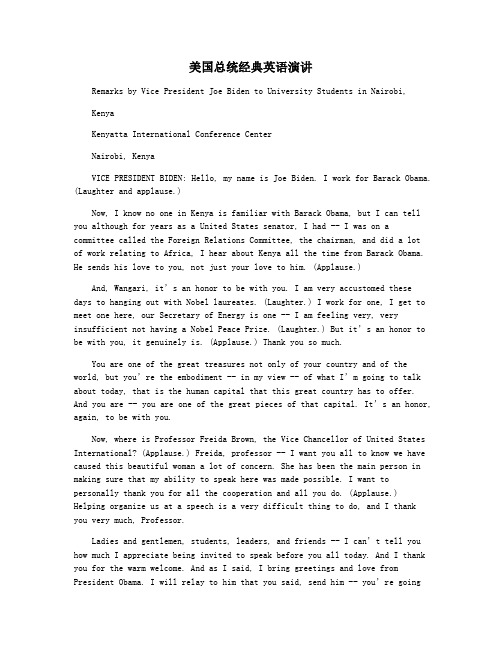
美国总统经典英语演讲Remarks by Vice President Joe Biden to University Students in Nairobi,KenyaKenyatta International Conference CenterNairobi, KenyaVICE PRESIDENT BIDEN: Hello, my name is Joe Biden. I work for Barack Obama. (Laughter and applause.)Now, I know no one in Kenya is familiar with Barack Obama, but I can tell you although for years as a United States senator, I had -- I was on a committee called the Foreign Relations Committee, the chairman, and did a lotof work relating to Africa, I hear about Kenya all the time from Barack Obama. He sends his love to you, not just your love to him. (Applause.)And, Wangari, it’s an honor to b e with you. I am very accustomed these days to hanging out with Nobel laureates. (Laughter.) I work for one, I get to meet one here, our Secretary of Energy is one -- I am feeling very, very insufficient not having a Nobel Peace Prize. (Laughter.) But it’s an honor to be with you, it genuinely is. (Applause.) Thank you so much.You are one of the great treasures not only of your country and of the world, but you’re the embodiment -- in my view -- of what I’m going to talk about today, that is the human capital that this great country has to offer. And you are -- you are one of the great pieces of that capital. It’s an honor, again, to be with you.Now, where is Professor Freida Brown, the Vice Chancellor of United States International? (Applause.) Freida, professor -- I want you all to know we have caused this beautiful woman a lot of concern. She has been the main person in making sure that my ability to speak here was made possible. I want to personally thank you for all the cooperation and all you do. (Applause.) Helping organize us at a speech is a very difficult thing to do, and I thank you very much, Professor.Ladies and gentlemen, students, leaders, and friends -- I can’t tell you how much I appreciate being invited to speak before you all today. And I thank you for the warm welcome. And as I said, I bring greetings and love from President Obama. I will relay to him that you said, send him -- you’re goingto send [him] love. But I want to reiterate, again, he sends his. He is committed. He is concerned, and he is deeply involved in the formation of our policy. And something that -- and he looks forward to the day that he will be able to come and visit as President of the United States of America. (Applause.) I’m sure there may not be -- I dou bt whether there’s enough room in the country to house everyone who wants to see him when he comes, but he is anxious to come.It’s great to be in your beautiful country. And it’s great to be infront of all of you. I come here as a representative of the United States to say one thing, one primary message -- the United States stands with you,stands with you on your journey to a secure, free, democratic, and prosperousKenya. It’s a journey nearly 50 years in the making.On December 12, 1963, 50,000 Kenyans filled the stadium in Nairobi and 200,000 -- 200,000 more -- I can remember, as a college student, watching200,000 more pack the hillsides around the stadium. An entire nation’s eyes watched as, at the stroke of midnight, the new Kenyan flag was unfurled forthe first time, making Kenya the 34th independent state in Africa.Earlier that week, American President Lyndon Baines Johnson sent a congratulatory letter to Prime Minister Kenyatta, welcoming Kenya to thefamily of nations and compar ing Kenya’s journey toward independence with that of America’s. And he said, and I quote, “As our own freedom for all our citizens was proclaimed to the world by our Declaration of Independence, so Kenya’s freedom begins with her declaration of independence today.”Some 50 years later, the promise of that day still pulses through this country, on the bustling streets of Nairobi, from -- up to Mount Kenya, fromthe coastal shores of Mombasa to the plains of the Maasai Mara. Once, the wealth of a nation was defined by the expanse of its land, the size of its population or the strength of its army, the abundance of its natural resources. But, now, we know -- and you know -- that the true wealth of a nation is found in its human capital, in the skill, ingenuity, and determination of its people. And by that measure, Kenya -- Kenya is a very wealthy nation. Indeed, Kenya is a rich nation.You have no oil. You have no precious minerals. But you have built the largest non-oil, non-mineral based economy in sub-Saharan Africa. You have become -- (applause) -- you have become the hub for the transportation for thegoods and people that are -- flow through East Africa. And you are the financial capital of East Africa.Your diplomats have helped solve some of A frica’s most intractable problems. Your military is small in number, but large in stature, helping to bring stability to Sierra Leone to East Timor. You’ve produced world-renowned scientists, geneticists, environmentalists, writers, and a Nobel Prize winner. (Applause.)At the heart of this success is a conviction that education -- education has the potential to transform a nation -- seven public universities, over 20 private ones, among the most of any on the continent of Africa; a determination to make primary and secondary education available to all, although there’s a long way to go.Americans know first-hand your commitment to education. Thousands of our citizens have studied in Kenya. And Kenyans have long been among the largest groups of African students at American universities. And today, Kenyans are the largest group of African students at American universities. (Applause.) And that tradition goes back before your independence. One of the earliest pioneers was a fellow named Barack Obama Sr., the father of a man who is now the President of the United States of America.Kenya and Kenyans have much to be proud of. But the full force of your potential -- as all ofyou young students know -- has yet to be released. You face dauntingobsta cles. Kenya is situated in a very tough neighborhood. Somalia’s decades of instability have generated human tragedy and global threats. We recognize the burden it’s placed on Somalia’s neighbors and the terrible human cost that the Somali people have borne.And I want to thank -- I want to thank Kenya for hosting Somali refugees who have come looking for safety and for prosecuting pirates not just in Somali waters, but increasingly in the vast swathes of East African waters.Next January, the referendum on the future of southern Sudan envisioned by the Comprehensive Peace Agreement will occur, and it must be credible and it must be peaceful. Sudan is hurtling toward a monumental decision that demands urgent international attention and preparation. And far too many of the people in Sudan’s Darfur region continue to live with unacceptable insecurity. These regional issues are all on your doorstep. They are felt in your communities.They are present, real challenges that we must work on together in partnership to address.The global financial crisis -- generated through no fault of Kenya’s -- dampened your economy, slowing demand for Kenyan goods abroad and lessened the flow of tourists eager to see Kenya’s natural beauty. Global climate changeis not a phenomenon of Kenya ’s making, but its consequences affect your forests, your harvests, and your way of life.Kenya feels the effects of these problems and should, because of your wealth of human capital, be a part of a global solution -- a strong African voice on the international stage. But that voice has been muted by internal problems -- problems that have held you back from making an even greater contribution.Too many of your resources have been lost to corruption, and not a single high-level official has ever been held accountable for these crimes. Too many of your institutions have lost the people’s confidence. And too many times, Kenya has been divided against itself, torn apart by ethnic tensions, manipulated by leaders who place their own interests above the interests of their country. Too many young people have found nothing but dead ends as they seek opportunity and the path to a better future.The crisis that gripped Kenya in the wake of the 2019 elections revealed just how dangerous these forces can be. They are dangerous, but they are not immovable. Change is within your grasp. And that change will be realized when government is transparent, accountable, and participatory; when corrupt officials are called to account in a court of law, instead of meeting only the indifferent shrug of impunity; when political power changes hands peacefully, but the will of the voters, and those who did not prevail decide -- and decide that their efforts should be moved to constructive opposition; when Kenyans have confidence that the courts and the police are honest, and are committed solely to the pursuit of justice; when the members of the political leadership represent a range, a wide range, of viewpoints reflecting and responding to the needs of Kenyans everywhere.Your coalition government has agreed to a reform agenda that would bring about the fundamental change that Kenyans are seeking. If implemented fully, corrupt officials will be finally held accountable. The judiciary and the police force will place the pursuit of justice above the pursuit of personal gain. Land rights and ownership will be governed by the rule of law, not bythe whims of the powerful. Kenyan women and girls -- the most untapped resource of this nation and almost every nation in the world -- will be ever better positioned to contribute to their communities and their country at every level. And a new constitution will put in place a framework to accelerate those reforms, including reducing executive power by building up the checks and balances of your parliament and your judiciary.Folks, in my experience of 36 years on the world stage, stability ultimately rests on the separation of powers --no power, no branch of government should go unchecked, including presidential power. The truth is, better governance is not just an end in itself, it is your path to a lasting democratic stability and your ultimate stability. And, I might add -- presumptuous of me, as an outsider, to say -- it’s the best route to economic prosperity, sparking job creation, opening up opportunity, and improving the way of life for Kenyans everywhere.As I said earlier, the real strength of Kenya is your human capital. And you have so much potential, with two-thirds of your citizens under the age of 25 -- two-thirds under the age of 25. That should be an incredible sense and source of strength that should be mined, that should be nurtured. But it requires creative and productive outlets for the energy and enthusiasm of the youth in your country.Putting in place a new constitution and strengthening your institutions and the rule of law will not only unleash the energy of the youth, deepen the roots of your democracy, and ultimately guarantee your security -- it will also further open the door to major American development programs like the Millennium Challenge. There’s so much more we could do, and want to do, in partnership with you. It could provide millions of dollars in grant assistance to Kenya that you would know how to use well to build this great nation.Reform will also encourage -- and I have -- I have been all over the world in my career. I promise you, foreign investment depends upon stability, transparency, the rule of law, and the crackdown on corruption. So if you make these changes, I promise you, new foreign private investment will come in like you’ve never seen and you will have a reinvigorated tourism industry thatwill exceed the billion dollars it was before the economic crisis. As I told your President and Prime Minister, who I met with jointly yesterday, Americans -- I can only speak for America, Americans want to do business here. You have everything that they would want to cooperate and participate here. They want to travel here. And if you provide the right climate, they will come -- andnot only they, but the rest of the world will come. You are the keystone to East Africa -- literally, not figuratively -- you are the keystone.Fostering the kind of change that is at hand is not up to the political elites, it’s up to you. It’s up to the Kenyan people. It’s up to each one of you. As President Obama said, “Africa’s future is up to Africans.” We can’t dictate it -- nor should we -- but you can, you can. And it’svirtuallyunlimited. Don’t let others determine for you. Don’t let others determine for Kenya what Kenyans think. Determine for yourselves the Kenya you actually need.Democracies are most effective when people not only vote for them, but embrace their responsibilities under a democratic system -- when they commit to be active citizens, aware citizens, when they participate, when they vote.Today, Kenya is having a great national debate about a new constitution. That debate will culminate in a referendum this August. The cooperation of [the] President and Prime Minister in support of the constitutional review process is extremely encouraging. But the ultimate responsibility, the real power, does not rest with them -- it rests with you. It rests with the people of Kenya. By your participation, by your vote -- as cynical as you may have become about the process -- by your participation, by your vote, you have before you a singular opportunity to strengthen Kenya’s democratic institutions, none like since the evening at midnight that that flag was unfurled, an opportunity to open up to opportunity to give a new generation new power to help Kenya realize its immense potential.The United States strongly supports the process of constitutional reform, including providing assistance for voter registration and civic education, so that Kenyans are able to familiarize themselves with the draft constitution your parliament passed and allow you to make informed decisions. But, let me repeat, this is your decision, your decision alone. And the people of Kenya must make this choice -- a choice for Kenya by Kenyans.And as you prepare to write a new history for your nation, resist those who try to divide you based on ethnicity or religion or region -- and above all, fear is a tool as old as mankind, and it’s been used with great eff ect in this country in the past. For too long -- for too long, opportunistic politicians have created an all-or-nothing system -- your group is either inor you’re out, and the resources of the state were treated as spoils for the winner, rather than the rightful birthright of the people of Kenya.When this toxic brand of politics is taken to its logical extreme in Kenya’s post-election violence, the results, I think, shocked even all of you -- but it clearly shocked the world. Now, Kenyans must make a deliberate and difficult choice -- to reject the divisive politics, to reconcile their communities, to acknowledge the injustice of the past so you do not harbordeep-seated resentment in the future. This resolve requires a deep inner strength --strength you can, and should, derive from your diversity.Turn Kenya’s youth into a source of innovation and vision. Dare to reach for transformational change -- the kind of change that might come around only once in your lifetime. I especially call on the young people -- the backboneof this country -- the next generation of Kenyan leaders. Your energy is contagious, and your enthusiasm is boundless. Your ideas and your voice canhelp create a peaceful, stable, democratic, and economically prosperous Kenya everyone here wants to see -- and, quite frankly, we want to see.And you have a steadfast supporter in the United States. The United States of America’s relationship with Kenya is among the most important on the continent for us, one that has been strong and uninterrupted since your independence. Thousands of American Peace Corps volunteers have taught in your schools and villages. Hundreds of American businessmen have worked in American companies that have built their regional headquarters in Nairobi or Mombasa. And the U.S. government has established its largest embassy in sub-Saharan Africa in your capital.In crisis and in celebration, we have forged a strong and enduringpolitical and economic relationship. We have worked together as partners and friends to tackle some of the most difficult problems in the region. But true friendship -- and I hope you will forgive me, but true friendship demands honesty. So if our words are sometimes blunt, it’s because our faith in the possibilities of Kenya are unlimited.Now, don’t get me wrong, I know from my person al experience, change is never easy. And change in circumstances like yours is extremely difficult. Fundamental change is never easy. But I also know from personal experiencethat it’s possible. I’ve seen it happen around the world. As a young senator, I’ve stood in the capitals of Sarajevo and Pristina -- in the Balkans. Fromthe Balkans to the Middle East to Eastern Europe, I have seen dark paths transform, through the will of the people, to bring about brighter futures.In the 1990s, I stood in Sarajevo, Bosnia, and in Pristina, Kosovo, and witnessed the god-awful carnage and the blood running in the rivers, theethnic cleansing that we thought we’d never see again in Europe. I saw the carnage and the hate. I sat in refugee centers. I sat in homes and heard about how neighbors who had been friends for years literally hacked one another to death in their backyards once Slobodan Milosevic’s ugly, ugly violence took hold. The hate, it seemed to know no bounds. And it seemed like it would never end.But, the people of those countries, they made a choice. They ultimately rejected violence. They drew a line on the past and today they are looking toward a future. And they’ve given up their own vile criminals to the international courts, which is part of the reconciliation that was needed, acknowledging their individual responsibilities.It was a choice that not only is changing their future, but is changingthe future of that entire portion of Europe. And just one year ago, I was in Romania celebrating the 20th Anniversary of the fall of communism and the wall. And I said then, “Now, we think of central Europe” -- “when we think of Central Europe, we don’t think of what we can do for you, but wha t we can do with you.”My prayer is that very soon after you make these momentous changes thatare needed, we’ll be talking about not what we can do for you, but what wecan do with you, because you have begun to realize the great potential you possess. The change is within your reach. The same change that occurred inother parts of the world, including Iraq, can change here.Ladies and gentlemen, nowhere is it written that the winds of changecannot blow through Africa -- nowhere is that written. On December 12, 1963, a new day dawned on Kenya, one filled with promise for even better days ahead.In the coming days and months, you have to -- the chance to build on that promise in a way you haven’t had for over three decades, to fulfill the dreams of everyone who watched that flag unfurl in that stadium 47 years ago.And I want to close with some words that President Johnson used to end his letter to Prime Minister Kenyatta in 1963. Here’s what he said -- he said, “May the responsibilities of freedom wake the best that i s in you, and mayits benefits be known by generations yet unborn.” Well, I would say the same thing to you today.Asante sana. May God bless you. (Applause.) May God bless the Kenyan people. (Applause.) And may God bless America. Thank you very much. Don’t let your country d own. Thank you. (Applause.)。
杰布布什正式宣布参加2023美国总统大选英语演讲稿
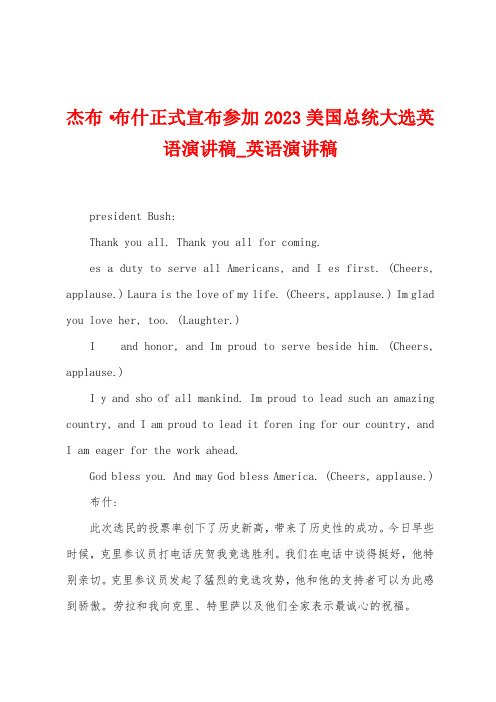
杰布·布什正式宣布参加2023美国总统大选英语演讲稿_英语演讲稿president Bush:Thank you all. Thank you all for coming.es a duty to serve all Americans, and I es first. (Cheers, applause.) Laura is the love of my life. (Cheers, applause.) Im glad you love her, too. (Laughter.)I and honor, and Im proud to serve beside him. (Cheers, applause.)I y and sho of all mankind. Im proud to lead such an amazing country, and I am proud to lead it foren ing for our country, and I am eager for the work ahead.God bless you. And may God bless America. (Cheers, applause.) 布什:此次选民的投票率创下了历史新高,带来了历史性的成功。
今日早些时候,克里参议员打电话庆贺我竞选胜利。
我们在电话中谈得挺好,他特别亲切。
克里参议员发起了猛烈的竞选攻势,他和他的支持者可以为此感到骄傲。
劳拉和我向克里、特里萨以及他们全家表示最诚心的祝福。
美国做出了选择。
对于同胞们的信任,我很感谢。
这种信任意味着我将担当为全部美国公民效劳的义务。
作为你们的总统,我每天都将竭尽全力。
我需要感谢很多人,首先是我的家人。
劳拉是我一生的挚爱,我对你们也爱她感到快乐。
我还要感谢在竞选后期参加竞选团的女儿,感谢兄弟姐妹们付出的努力,特殊感谢严父慈母的支持。
我感谢副总统、(他的夫人)莱尼和他们的女儿。
拜登
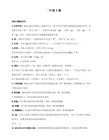
自1975年以来,他一直是具有影响力的参议院对外关系委员会(SenateForeignRelations
约瑟夫·拜登
Committee)成员,并于2001年至2003年以及2007年至今,担任该委员会主席。奥巴马2004年当选联邦参议员后加入对外关系委员会,在与拜登共事的过程中加深了对他的了解。奥巴马目前担任欧洲小组委员会主席,而该小组委员会前任主席就是拜登。但奥巴马和拜登在一个至关重要的对外政策问题上有过分歧。拜登曾投票支持参议院授权美国出兵伊拉克的最后决议,而奥巴马(当时还不是联邦参议员)公开反对这项决议。
小约瑟夫·罗宾内特·“乔”·拜登(Joseph Robinette "Joe" Biden, Jr.,1942年11月20日-),美国特拉华州的律师和政治家,美国现任副总统。
他属民主党籍,是特拉华州的Fra bibliotek任资深联邦参议员。拜登目
约瑟夫·拜登
前处在第六届任期,是该州服务时间最长的参议员。他是美国第110届国会的参议院“外交委员会”主席,他以前曾经担任过这个职务,并且曾经担任参议院“司法委员会”主席。
其次,拜登出生于宾夕法尼亚州斯克兰顿一个普通工薪家庭,与工会组织关系良好,对蓝领阶层颇有号召力。奥巴马预选阶段在争取这一阶层支持上的表现不及希拉里,或许希望借拜登人气提升支持率。
最后,共和党曾指责奥巴马在打击国内犯罪问题上立场软弱,一项国会1994年通过的打击犯罪法案由拜登带头起草,他的加盟无疑将扭转这一印象劣势。
奥巴马看中拜登三大优势
让一位担任参议员
奥巴马和拜登
30多年的政治人物成为自己的副手,奥巴马可谓斟酌再三。美国媒体根据拜登从政经验,总结出他能给奥巴马带来的三大支持。 媒体先前猜测的所有热门人选中,拜登在防务和外交事务上经验最丰富,这一点正是奥巴马与麦凯恩竞争时的软肋。美联社说,虽然经济议题已经超过伊拉克战争,成为选民最关心议题,但近期发生的格鲁吉亚南奥塞梯冲突让安全议题再成焦点。加上麦凯恩阵营在奥巴马的经验劣势上大做文章,奥巴马的民意优势逐渐消失,甚至在部分民调中遭对手首次超越。拜登加盟可能部分消除选民对奥巴马外交经验的质疑,抵消麦凯恩在这一点上的优势。
奥巴马就职演讲
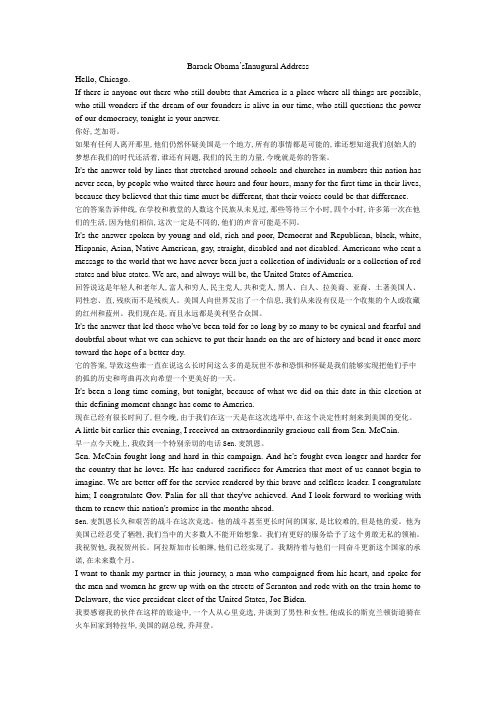
Barack Obama’sInaugural AddressHello, Chicago.If there is anyone out there who still doubts that America is a place where all things are possible, who still wonders if the dream of our founders is alive in our time, who still questions the power of our democracy, tonight is your answer.你好,芝加哥。
如果有任何人离开那里,他们仍然怀疑美国是一个地方,所有的事情都是可能的,谁还想知道我们创始人的梦想在我们的时代还活着,谁还有问题,我们的民主的力量,今晚就是你的答案。
It's the answer told by lines that stretched around schools and churches in numbers this nation has never seen, by people who waited three hours and four hours, many for the first time in their lives, because they believed that this time must be different, that their voices could be that difference.它的答案告诉伸线,在学校和教堂的人数这个民族从未见过,那些等待三个小时,四个小时,许多第一次在他们的生活,因为他们相信,这次一定是不同的,他们的声音可能是不同。
It's the answer spoken by young and old, rich and poor, Democrat and Republican, black, white, Hispanic, Asian, Native American, gay, straight, disabled and not disabled. Americans who sent a message to the world that we have never been just a collection of individuals or a collection of red states and blue states. We are, and always will be, the United States of America.回答说这是年轻人和老年人,富人和穷人,民主党人,共和党人,黑人、白人、拉美裔、亚裔、土著美国人、同性恋、直,残疾而不是残疾人。
2011.8美国副总统拜登在四川大学的演讲英汉对照
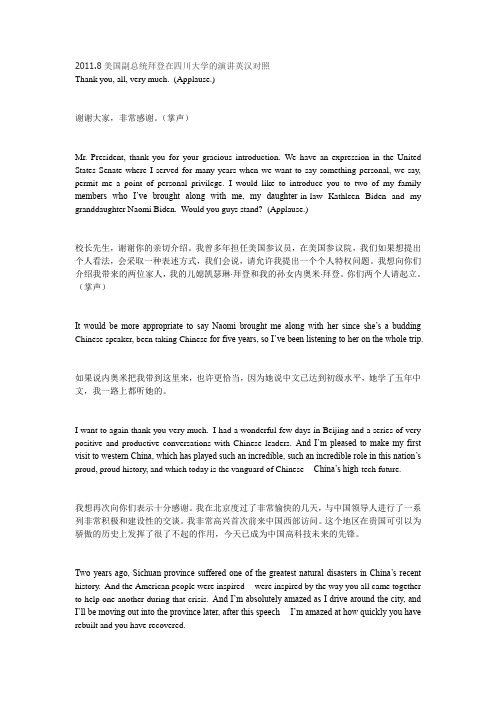
2011.8美国副总统拜登在四川大学的演讲英汉对照Thank you, all, very much. (Applause.)谢谢大家,非常感谢。
(掌声)Mr. President, thank you for your gracious introduction. We have an expression in the United States Senate where I served for many years when we want to say something personal, we say, permit me a point of personal privilege. I would like to introduce you to two of my family members who I’ve brought along with me, my daughter-in-law Kathleen Biden and my granddaughter Naomi Biden. Would you guys stand? (Applause.)校长先生,谢谢你的亲切介绍。
我曾多年担任美国参议员,在美国参议院,我们如果想提出个人看法,会采取一种表述方式,我们会说,请允许我提出一个个人特权问题。
我想向你们介绍我带来的两位家人,我的儿媳凯瑟琳∙拜登和我的孙女内奥米∙拜登。
你们两个人请起立。
(掌声)It would be more appropriate to say Naomi brought me along with her since she’s a budding Chinese speaker, been taking Chinese for five years, so I’ve been listening to her on the whole trip.如果说内奥米把我带到这里来,也许更恰当,因为她说中文已达到初级水平,她学了五年中文,我一路上都听她的。
初中英语名人演讲稿人人都可能当总统—布什在耶鲁大学的演讲素材(最新整理)
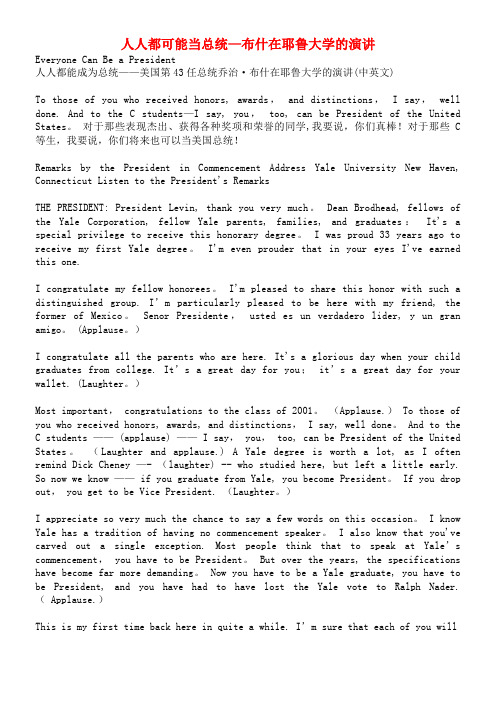
人人都可能当总统—布什在耶鲁大学的演讲Everyone Can Be a President人人都能成为总统——美国第43任总统乔治·布什在耶鲁大学的演讲(中英文)To those of you who received honors, awards,and distinctions,I say,well done. And to the C students—I say, you,too, can be President of the United States。
对于那些表现杰出、获得各种奖项和荣誉的同学,我要说,你们真棒!对于那些C 等生,我要说,你们将来也可以当美国总统!Remarks by the President in Commencement Address Yale University New Haven, Connecticut Listen to the President's RemarksTHE PRESIDENT: President Levin, thank you very much。
Dean Brodhead, fellows of the Yale Corporation, fellow Yale parents, families, and graduates:It's a special privilege to receive this honorary degree。
I was proud 33 years ago to receive my first Yale degree。
I'm even prouder that in your eyes I've earned this one.I congratulate my fellow honorees。
I'm pleased to share this honor with such a distinguished group. I’m particularly pleased to be here with my friend, the former of Mexico。
介绍伟人事迹的英文演讲稿
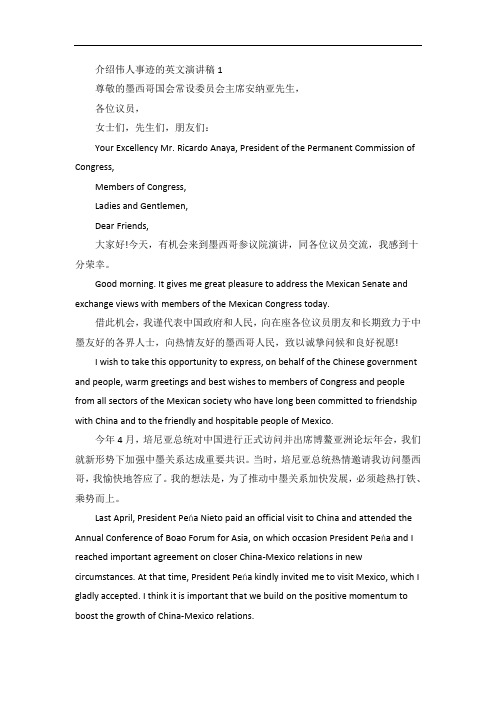
介绍伟人事迹的英文演讲稿1尊敬的墨西哥国会常设委员会主席安纳亚先生,各位议员,女士们,先生们,朋友们:Your Excellency Mr. Ricardo Anaya, President of the Permanent Commission of Congress,Members of Congress,Ladies and Gentlemen,Dear Friends,大家好!今天,有机会来到墨西哥参议院演讲,同各位议员交流,我感到十分荣幸。
Good morning. It gives me great pleasure to address the Mexican Senate and exchange views with members of the Mexican Congress today.借此机会,我谨代表中国政府和人民,向在座各位议员朋友和长期致力于中墨友好的各界人士,向热情友好的墨西哥人民,致以诚挚问候和良好祝愿!I wish to take this opportunity to express, on behalf of the Chinese government and people, warm greetings and best wishes to members of Congress and people from all sectors of the Mexican society who have long been committed to friendship with China and to the friendly and hospitable people of Mexico.今年4月,培尼亚总统对中国进行正式访问并出席博鳌亚洲论坛年会,我们就新形势下加强中墨关系达成重要共识。
当时,培尼亚总统热情邀请我访问墨西哥,我愉快地答应了。
我的想法是,为了推动中墨关系加快发展,必须趁热打铁、乘势而上。
- 1、下载文档前请自行甄别文档内容的完整性,平台不提供额外的编辑、内容补充、找答案等附加服务。
- 2、"仅部分预览"的文档,不可在线预览部分如存在完整性等问题,可反馈申请退款(可完整预览的文档不适用该条件!)。
- 3、如文档侵犯您的权益,请联系客服反馈,我们会尽快为您处理(人工客服工作时间:9:00-18:30)。
Joseph Robinette Biden, Jr., was born November 20, 1942, in Scranton, Pennsylvania, the first of four siblings. In 1953, the Biden family moved from Pennsylvania to Claymont, Delaware. He graduated from the University of Delaware and Syracuse Law School and served on the New Castle County Council. Then, at age 29, he became one of the youngest people ever elected to the United States Senate.
Just weeks after the election, tragedy struck the Biden family, when Biden's wife, Neilia, and their 1-year old daughter, Naomi, were killed and their two young sons critically injured in an auto accident. Vice President Biden was sworn in to the U.S. Senate at his sons' hospital bedside and began commuting to Washington every day by train, a practice he maintained throughout his career in the Senate.
In 1977, Vice President Biden married Jill Jacobs. Jill Biden, who holds a Ph.D. in Education, has been an educator for over two decades and currently teaches at a DC-area community college. The Vice President has three children: Beau, Hunter, and Ashley. Beau serves as Delaware's Attorney General and recently returned home from Iraq where he served as a Captain in the 261st Signal Brigade of the Delaware National Guard. Ashley is a social worker and Hunter is an attorney. Vice President Biden has five grandchildren: Naomi, Finnegan, Roberta Mabel ("Maisy"), Natalie, and Robert Hunter.
As a Senator from Delaware for 36 years, Senator Biden established himself as a leader on some of our nation's most important domestic and international challenges. As Chairman or Ranking Member of the Senate Judiciary Committee for 17 years, then-Senator Biden was widely recognized for his work on criminal justice issues including the landmark 1994 Crime Bill and the Violence Against Women Act. As Chairman or Ranking Member of the Senate Foreign Relations Committee since 1997, then-Senator Biden played a pivotal role in shaping U.S. foreign policy. He has been at the forefront of issues and legislation related to terrorism, weapons of mass destruction, post-Cold War Europe, the Middle East, and Southwest Asia.
Now, as the 47th Vice President of the United States, Joe Biden has continued his leadership on
House initiative targeted at raising the living standards of middle class families in America. In addition, he is providing sustained, high level focus for the administration on Iraq policy and has traveled to the country multiple times since being elected as Vice President. Vice President Biden continues to draw on his vast foreign policy experience, advising the President on a multitude of international issues and representing our country to many regions of the world, including travel to Germany, Belgium, Chile,。
